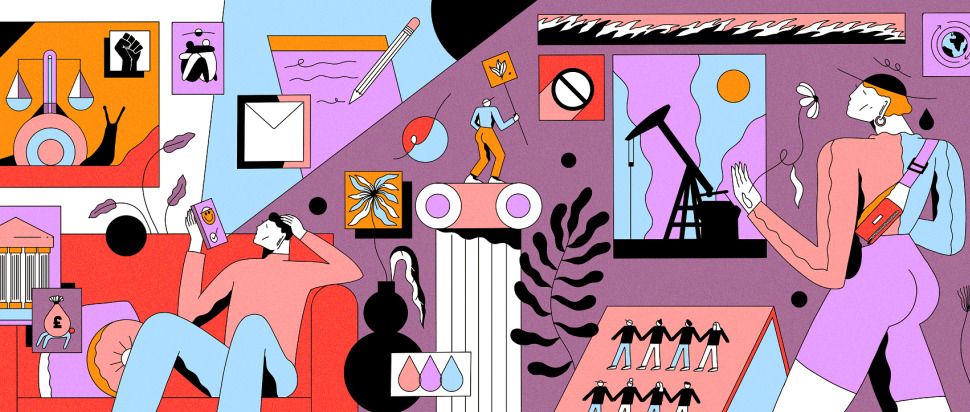All is Not Lost: Rethinking failure in activism
In activist movements, failings are difficult to come to terms with. But failure may be more complex – and a little more hopeful – than we thought
Failure in activism is disappointing. It can be devastating to witness social change occurring at a snail’s pace, or worse, to see significant social justice reform reversed by politicians and lobbyists alike. It is frustrating: the cycle of collective will bubbles up towards a promising sense of action, only for regressive politics to have the final say.
Activism itself is a term that is understood vaguely as participation in or support for campaigns towards a political aim or social change. The shifting priorities and goalposts in politics and social justice means that it is not a straightforward, or even stable, path.
Currently, climate justice is a top priority. A report by Climate Action Tracker found that countries are not doing enough to limit global warming to 1.5 degrees by 2030. Meanwhile, as governments flounder with policy, the net profits of fossil fuel companies including Shell and Exxon Mobil soared to $174bn in 2021, as reported by the Guardian. With rising living costs and energy bills in the UK, energy company profits reveal that private, corporate interests are prioritised over human life and social justice. Last year, Glasgow’s COP26 dominated public consciousness; however, the event left young activists disillusioned by corporate greenwashing. Despite the event’s promise of change, dodgy companies were given platforms to preach their hollow promises and young activists were banned from certain talks. The 'failure' of COP26, therefore, is an infrastructural one: the event was seemingly designed with the intent to suppress. Failure is somewhat inevitable in such cases.
The #StopCambo campaign opposes the opening of new oil and gas fields in the UK. The movement recently had a huge win after spotlighting the damage that plans to build an oil field in Cambo, west of Shetland, would cause to the environment. This incredible work saw Shell and partner company Siccar Point Energy pull out of the development project in December 2021. However, the UK government has since been open to fossil fuel exploration in the North Sea, meaning that #StopCambo’s victory is not a permanent win, but rather a victory within a continual fight. Cases like this suggest that the binary of failure and success is unhelpful when examining the ambivalent, unpredictable results of activism.
But failings in activism are not always about the cause itself. In activist circles, we all too often find ourselves tangled up in hero worship. We unconsciously embrace the idea of a single, decisive political leader that mobilises the masses. Because crises leave many individuals feeling powerless, the idea of a hero’s actions inspiring hope and saving the day is attractive. Meanwhile, putting pressure on activists to act in a certain way and to fix the world creates burnout and unhappiness, failing the individual while also limiting the movement. Movements require a multitude of skills, talents, and voices to be successful.
This is evident in changes within activism itself. The rise of internet culture means that activism looks very different from the days where physically interactive, live community building was crucial to movements. In-person contact and organising is no longer completely necessary in activism and many regret this collective shift. Specifically, many worry that the move towards digital activism undermines the participation and active culture that makes movements powerful. Terms like ‘slacktivism’ denote an emerging reality where individuals can gesture at social justice they approve of via signing online petitions, or sending emails to their MP. The term seeks to criticise this online participation, which differs greatly to the traditional idea of an activist as a courageous protester that tirelessly takes to the streets. Indeed, in-person organising can lead to big wins, such as the success of the campaign to get private airline TUI to stop running deportation flights for the government. However, the shift to online activism is not a failure of activism, but the refusal of some to utilise and appreciate the benefits of online activism most certainly is.
Such gatekeeping is a recurring theme in certain movements: for instance, this subtle but insidious idea that climate justice is a cause for benevolent white people and not Black people, or other People of Colour. Racism in the climate justice movement holds everyone back because creating a hostile environment for non-white demographics means the movement will automatically be less effective. The hard lines drawn around who is allowed to get involved is ultimately a failure of activism; rather, community should be fostered by striving for shared goals.
Failure in activism is not necessarily a cause for despair – it is also a call to action. Failure is a litmus test: it sheds light on what still needs to be done, who is preventing such action, and what social attitudes are caught up in all this. Collective power may not always manage to overturn longstanding dominant powers and this might mean that activist movements 'fail'. But failure in activism is not always a permanent failure of activism – and there is much hope in that.
